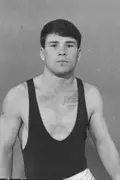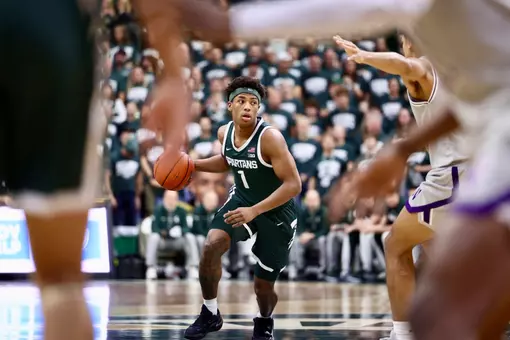Michigan State University Athletics
Hall of Fame

Dale Anderson
- Induction:
- 2018
- Class:
- 1968
Dale Anderson
Wrestling (1965-68)
Waterloo, Iowa
MSU Athletics Hall of Fame Class of 2018
HIGHLIGHTS:

HALL OF FAME FEATURE: CLASS OF 2018
The unmatched overall success of Michigan State athletics in the mid to late 1960s produced some of the most accomplished student-athletes in the history of the university. A total of seven national championships across four sports in a three-year span formed legacies that are still revered today.
The Spartans' success came from student-athletes of diverse backgrounds from all parts of the country, including one from a small Iowa farm with no running water and no electricity. Dale Anderson was born on that small farm near Fort Dodge, Iowa, and from those modest beginnings he went on to be one of the top wrestlers in the country and a two-time national champion.
It was after moving to Waterloo, Iowa, that Anderson became more immersed in the sport of wrestling. By his junior year he had done enough to earn a visit from Michigan State wrestling head coach Grady Peninger, who came bearing a scholarship offer.
"To receive a full-ride scholarship was very rare in 1960s,"Anderson said.
His success on the mat -- and in the classroom -- continuing to trend upward as a senior, Anderson garnered interest from just about every wrestling program in the country.
"My old high school coach seemed to be my PR guy and knew all the college coaches," Anderson said. "He said to me my senior year, `you'll be a national champion.'"
With Ivy League and Big Ten schools all competing to land the athletically and academically accomplished Anderson, the Iowa native decided to stay home, enrolling at Iowa State. But, his decision soon changed again.
"I transferred after the first term," Anderson said. "I felt bad that I didn't go to Michigan State and that was mainly because of the coaches in Grady and Doug (Blubaugh) -- they were great coaches I wanted to wrestle for them."
Anderson's decision to transfer to Michigan State provided a huge boost to a program on the rise. Under head coach Grady Peninger, the Spartans won their first of seven consecutive Big Ten titles in 1965. The following year in 1966, Anderson won his first Big Ten title at 130 pounds, as MSU claimed another team championship.
While the Spartans were kings of the Big Ten, they were looking to further establish themselves on the national stage. The Spartans' confidence increased as the season progressed, buoyed by a regular-season win over perennial national power Oklahoma.
"The song `Respect' by Aretha Franklin was new then and it was kind of our theme song," Anderson said. "We took on that song as our own. The only way you get respect is to go out there and earn it. We went from not being able to get our girlfriends to come watch us wrestle to having thousands people at a meet.
"Things fell into place that season. We certainly didn't go into year thinking that we were going to win the national championship; we were nobodies in the wrestling world. We just wanted respect."
Respect came the Spartans' way as they won the 1967 national championship. Anderson also claimed his first of two individual national crowns at 137 pounds, capping an undefeated season (25-0) by beating Masaru Yatabe of Portland State.
Known for his intensity and aggressiveness, Anderson harnessed those qualities to outlast Yatabe, 3-2 in overtime after ending regulation tied, 6-6.
"Going into the 1967 championship match, I so anxious and that totally wore me out," Anderson said. "I wanted to win so badly and when you want to win too much, you wear yourself out. I was so exhausted in that title match my junior year, yet was able to get it to OT and won."
Anderson's year didn't just end with a team and individual national title and unblemished record, he also went "undefeated" in the classroom.
"I got a perfect 4.0 that year," Anderson said. "Coincidentally when grades came out after the national championship, I found out I got a 4.0. President John Hannah was proud of me; I liked him, he was a great guy."
As a senior the following season, Anderson and the Spartans won another Big Ten crown as he captured his second straight individual conference title. MSU took fourth as a team at the 1968 NCAA Championships and Anderson again found himself in the national title match against a familiar foe, Yatabe. But another year of experience had Anderson entering the championship bout better prepared.
"The 1968 match was a million times easier than the prior year," Anderson said. "Even though I was five points down at one point, I knew I could come back and beat him.
"I was so relaxed, I had already won a title the previous year and I felt really good and confident. I knew he was a better wrestler and knew I was more intense than him; I would wear him out and that's what I did. I wore him out both years."
Anderson did exactly that, topping Yatabe, 9-5, to win the national championship. He is one of five two-time NCAA Champions in Michigan State history.
Anderson's dedication in the classroom was again recognized as he was named MSU's recipient of the Big Ten Conference Medal of Honor, which is awarded annually to a male and female athlete at each of the Big Ten institutions to the students demonstrating the greatest proficiency in scholarship and athletics.
He ended his Spartan career with a record of 61-4-1 and his .932 winning percentage ranks fourth in program history.
The Spartans' success and national championship spurred Anderson to author a book about the team's dream season. In 2016 Anderson published A Spartan Journey: Michigan State's 1967 Miracle on the Mat. The book chronicles the Spartans' run to the title, but also notes the great success of all MSU programs at the time.
"When you're in the middle of something like that, you really don't think about it," Anderson said. "I enjoyed going to see some of the other teams compete, like gymnastics, swimming and track. We had a lot of great sports outside of football and you just expected success from other teams. We had zillions of big men on campus -- just so many great athletes. Like I said, you were just expected to win and that came from President Hannah and Biggie Munn -- they were the catalysts that made this happen."
In fact, it was a Spartan legend from another sport that had a great impact on Anderson writing the book.
"One of the things that really inspired me was what Magic Johnson said to the 2000 National Championship team - that they would not fully appreciate what they had done for a long time. That's what happened to me -- I didn't fully appreciate what we did in 1967 until later. After 50 years, I said that was a really neat thing we did. It really hit me that we did something special."
Anderson, who earned his law degree from the University of Virginia, went on to a notable career as an attorney and still practices Constitutional law.
Wrestling (1965-68)
Waterloo, Iowa
MSU Athletics Hall of Fame Class of 2018
HIGHLIGHTS:
- Two-time NCAA Champion at 137 pounds (1967, 1968), helping MSU to the 1967 National Championship
- Three-time All-American and Big Ten Champion (1966, 1967, 1968)
- 1968 Big Ten Medal of Honor recipient

HALL OF FAME FEATURE: CLASS OF 2018
The unmatched overall success of Michigan State athletics in the mid to late 1960s produced some of the most accomplished student-athletes in the history of the university. A total of seven national championships across four sports in a three-year span formed legacies that are still revered today.
The Spartans' success came from student-athletes of diverse backgrounds from all parts of the country, including one from a small Iowa farm with no running water and no electricity. Dale Anderson was born on that small farm near Fort Dodge, Iowa, and from those modest beginnings he went on to be one of the top wrestlers in the country and a two-time national champion.
It was after moving to Waterloo, Iowa, that Anderson became more immersed in the sport of wrestling. By his junior year he had done enough to earn a visit from Michigan State wrestling head coach Grady Peninger, who came bearing a scholarship offer.
"To receive a full-ride scholarship was very rare in 1960s,"Anderson said.
His success on the mat -- and in the classroom -- continuing to trend upward as a senior, Anderson garnered interest from just about every wrestling program in the country.
"My old high school coach seemed to be my PR guy and knew all the college coaches," Anderson said. "He said to me my senior year, `you'll be a national champion.'"
With Ivy League and Big Ten schools all competing to land the athletically and academically accomplished Anderson, the Iowa native decided to stay home, enrolling at Iowa State. But, his decision soon changed again.
"I transferred after the first term," Anderson said. "I felt bad that I didn't go to Michigan State and that was mainly because of the coaches in Grady and Doug (Blubaugh) -- they were great coaches I wanted to wrestle for them."
Anderson's decision to transfer to Michigan State provided a huge boost to a program on the rise. Under head coach Grady Peninger, the Spartans won their first of seven consecutive Big Ten titles in 1965. The following year in 1966, Anderson won his first Big Ten title at 130 pounds, as MSU claimed another team championship.
While the Spartans were kings of the Big Ten, they were looking to further establish themselves on the national stage. The Spartans' confidence increased as the season progressed, buoyed by a regular-season win over perennial national power Oklahoma.
"The song `Respect' by Aretha Franklin was new then and it was kind of our theme song," Anderson said. "We took on that song as our own. The only way you get respect is to go out there and earn it. We went from not being able to get our girlfriends to come watch us wrestle to having thousands people at a meet.
"Things fell into place that season. We certainly didn't go into year thinking that we were going to win the national championship; we were nobodies in the wrestling world. We just wanted respect."
Respect came the Spartans' way as they won the 1967 national championship. Anderson also claimed his first of two individual national crowns at 137 pounds, capping an undefeated season (25-0) by beating Masaru Yatabe of Portland State.
Known for his intensity and aggressiveness, Anderson harnessed those qualities to outlast Yatabe, 3-2 in overtime after ending regulation tied, 6-6.
"Going into the 1967 championship match, I so anxious and that totally wore me out," Anderson said. "I wanted to win so badly and when you want to win too much, you wear yourself out. I was so exhausted in that title match my junior year, yet was able to get it to OT and won."
Anderson's year didn't just end with a team and individual national title and unblemished record, he also went "undefeated" in the classroom.
"I got a perfect 4.0 that year," Anderson said. "Coincidentally when grades came out after the national championship, I found out I got a 4.0. President John Hannah was proud of me; I liked him, he was a great guy."
As a senior the following season, Anderson and the Spartans won another Big Ten crown as he captured his second straight individual conference title. MSU took fourth as a team at the 1968 NCAA Championships and Anderson again found himself in the national title match against a familiar foe, Yatabe. But another year of experience had Anderson entering the championship bout better prepared.
"The 1968 match was a million times easier than the prior year," Anderson said. "Even though I was five points down at one point, I knew I could come back and beat him.
"I was so relaxed, I had already won a title the previous year and I felt really good and confident. I knew he was a better wrestler and knew I was more intense than him; I would wear him out and that's what I did. I wore him out both years."
Anderson did exactly that, topping Yatabe, 9-5, to win the national championship. He is one of five two-time NCAA Champions in Michigan State history.
Anderson's dedication in the classroom was again recognized as he was named MSU's recipient of the Big Ten Conference Medal of Honor, which is awarded annually to a male and female athlete at each of the Big Ten institutions to the students demonstrating the greatest proficiency in scholarship and athletics.
He ended his Spartan career with a record of 61-4-1 and his .932 winning percentage ranks fourth in program history.
The Spartans' success and national championship spurred Anderson to author a book about the team's dream season. In 2016 Anderson published A Spartan Journey: Michigan State's 1967 Miracle on the Mat. The book chronicles the Spartans' run to the title, but also notes the great success of all MSU programs at the time.
"When you're in the middle of something like that, you really don't think about it," Anderson said. "I enjoyed going to see some of the other teams compete, like gymnastics, swimming and track. We had a lot of great sports outside of football and you just expected success from other teams. We had zillions of big men on campus -- just so many great athletes. Like I said, you were just expected to win and that came from President Hannah and Biggie Munn -- they were the catalysts that made this happen."
In fact, it was a Spartan legend from another sport that had a great impact on Anderson writing the book.
"One of the things that really inspired me was what Magic Johnson said to the 2000 National Championship team - that they would not fully appreciate what they had done for a long time. That's what happened to me -- I didn't fully appreciate what we did in 1967 until later. After 50 years, I said that was a really neat thing we did. It really hit me that we did something special."
Anderson, who earned his law degree from the University of Virginia, went on to a notable career as an attorney and still practices Constitutional law.
Tom Izzo | Men's Basketball Press Conference | Feb. 02 2026
Monday, February 02
Robyn Fralick Post Game Comments | Michigan | Feb 1st, 2026
Sunday, February 01
Adam Nightingale Postgame Comments | Penn State | January 31, 2026
Saturday, January 31
Tom Izzo Post Game Comments | Michigan | Jan. 30 2026
Friday, January 30




